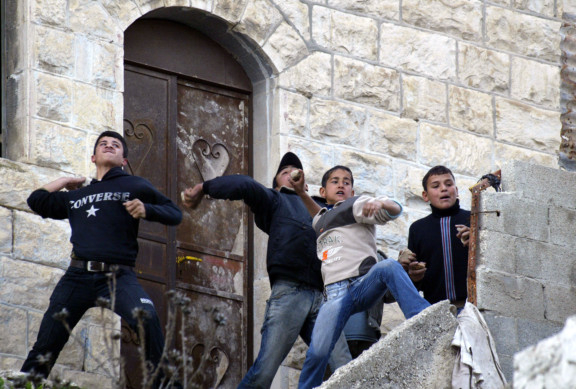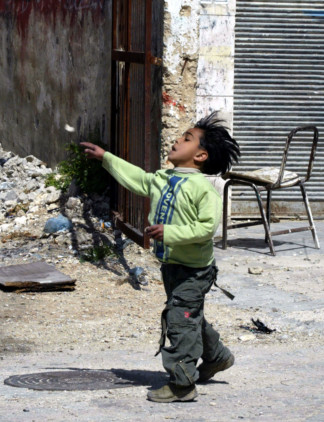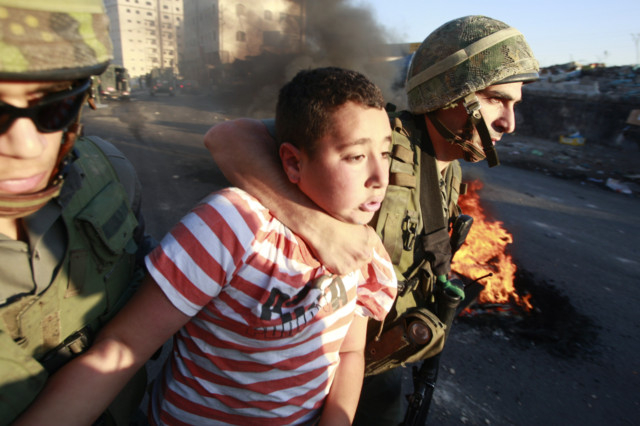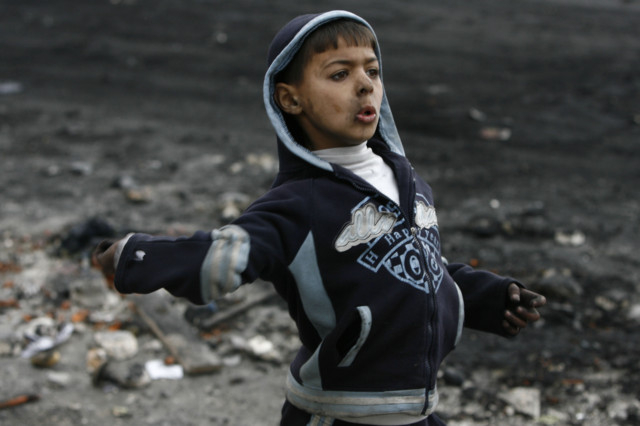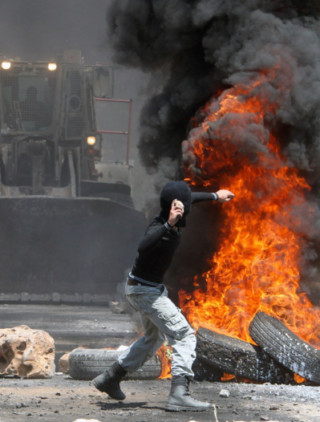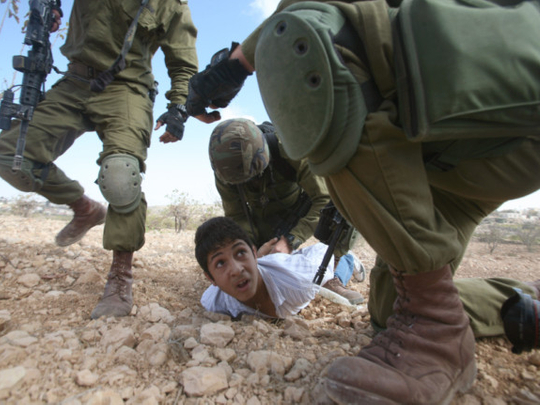
Dheishe Refugee Camp, Palestinian Territories: Umm Abdullah sits beneath a cross-stitched portrait of a keffiyeh-clad Palestinian youth holding a stone high in the air.
Her sunny, crumbling apartment in Dheishe refugee camp in the southern West Bank town of Bethlehem is filled with the laughter of children and grandchildren — but two of her sons are missing.
“The Israeli soldiers come in the night,” she says, staring at a faded photograph of a teenage boy. “They take our children.”
Three of her seven children spent time in Israeli prisons on stone-throwing charges when they were minors. Two of them, now adults, are still behind bars.
Her youngest, 20-year-old Abdullah, has been arrested three times — the first when he was 16.
In Dheishe, Umm Abdullah’s story is often the norm.
According to Defence for Children International (DCI), around 700 West Bank children are arrested every year, most accused of stoning Israeli soldiers and military vehicles.
Other charges include making petrol bombs and involvement in “terrorist groups”.
At the end of June, DCI figures showed that 221 Palestinian children were in detention. Of that number, 35 were aged between 12 and 15.
Stone throwing, a symbol of Palestinian resistance to the Israeli occupation, began among the youth of Jabaliya refugee camp in the northern Gaza Strip during the first Palestinian uprising (1987-1993).
And 25 years on, with those children now adults, their own children continue do the same.
Under Israeli military order 1651, throwing stones is an offence which can see a child as young as 14 sentenced to 10 years behind bars if it is directed at a person with the intent to harm, or up to 20 years if thrown at a vehicle.
DCI says children as young as 12 can be tried in Israeli military courts and imprisoned without charge for up to 188 days, although most are detained for between two weeks and 10 months.
In a 2012 report on stone throwing, Israeli rights group B’Tselem found that between 2005 and 2010, the military prosecuted 835 minors on stone-throwing charges.
“The IDF [Israel Defence Force] does not take lightly such serious incidents which endanger the safety of residents,” the army said in a written response.
When a child is arrested, the families often have to rely on information from neighbours and the Red Cross to find out where their sons have been taken.
According to local residents and DCI, interrogations are often conducted without the supervision of a parent or lawyer, and children often go for months without seeing their families.
Of the 30 children in his class, Jareishi says that 24 ended up in Israeli jails on charges of stone throwing and political involvement.
And the remaining six who weren’t arrested that year were all later sent to prison, he adds.
Many had to repeat the school year, or have yet to complete high school as they are still detained.
At 17, he himself was charged with throwing rocks and belonging to the Popular Front for the Liberation of Palestine (PFLP) — which Israel and the United States see as a terrorist group.
“Throwing stones shows the Israeli soldiers that we are still here, that we exist,” says Jareishi, glancing out the window.
“We want toys — not guns or rocks,” he says. “But this will only happen when the occupation ends and we get our rights back.”
Jareishi says that during interrogation, he was beaten and spent 51 days in solitary in a room barely bigger than he was.
There was no window and only a harsh fluorescent light that was always on, a tactic he believes is used to keep prisoners awake as a form of psychological torture.
When he did fall asleep, soldiers would blast music and drip water from the ceiling on his head.
B’Tselem has also accused the military of using interrogation techniques such as sleep deprivation, playing loud music, forcing detainees to sit on chairs with their bodies arched backwards, putting sacks over their heads, and exposure to extreme heat and cold.
According to the father of another 17-year-old detainee, child prisoners are forced to “confess” through threats of sexual violence and withholding medicine.
DCI has urged the United Nations to look into reports of sexual threats and assault.
Jareishi described how children as young as 12 were made to choose a “political affiliation” — either Fatah, Hamas, or PFLP — by which they were grouped in prison.
Although some children are actively involved in political groups and even smuggle weapons into refugee camps, others insist they are falsely accused.
Whispers circulated around Dheisheh in late July about Mahmud Al Badan, a 17-year-old who had just been released from prison with what doctors said was a broken jaw.
“They locked my family inside the house and beat me with guns in the street,” says Badan, his face black and blue as he sat in the hospital lobby. “But I am not afraid.”
Jamal Fraj was 14 when he was arrested for throwing petrol bombs at soldiers who raided Dheisheh. Now, more than 20 years later, his son Khaled is in Ofer prison near Ramallah on similar charges.
A framed photograph of Khaled sits next to him, taken when he was on hunger strike for 28 days in April and May.
Children in Dheisheh grow up with Israeli soldiers a constant presence, he says.
When he was small, Jamal threw stones at soldiers who entered the camp at night because he thought it was a game of cops and robbers. He says it was an attempt to normalise the abnormal.
“After I was in prison, I went from a child wanting to play to a man full of anger, resisting the occupation,” he says.


